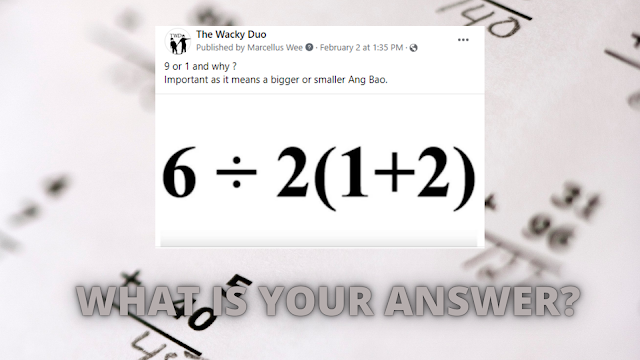How 6÷2(2+1) becomes an equation for Life Lessons
Recently, I posted this question on FB
6÷2(2+1) = ?
The answer provided was 1 or 9. Interestingly, the post had garnered responses with answers on both sides. A seemingly simple question had polarised people. While I am not the originator of the equation( the debate began back in 2021), I was curious as to what the answer is. In the end, my search led me to 2 different camps with a definite answer.
I am not a Mathematician by trade, but a curious old man by design.
Interestingly, I learn a lot more than the answer I seek. In fact, I picked up 8 life lessons from my 'research'. Here is what I learn from 6÷2(2+1)
1) There are more than one way to look at the problem
The main reason why there is more than a solution is how a person looks at the problem.
Ironically, both proponents quoted either BODMAS or PEDMAS to solve the problem. They are essentially the same thing.
PEDMAS - Parentheses, exponents, multiplication, division, addition, subtraction
BODMAS - Brackets, orders, division, multiplication, addition, subtraction
The problem is not whether PEDMAS or BODMAS is used. The issue is how one interprets 2(2+1). The first solution interprets 2(2+1) as a part of the distributive property and thus have to be solved first. The second method interprets 2(2+1) as 2 x (2+1) and hence solving using PEDMAS or BODMAS will result in the number 9.
Same problem, but a slightly different approach to it.
2) Not all problems need a solution

|
| Source: Internet |
Is there a solution to this problem?
Some had argued that the issue is with how the equation is written. It is ambiguous and thus causes this paradox. If it is written as 6÷(2(2+1)), you probably would not have any problem with this.
Even calculators have answered differently despite being manufactured by the same company!
So does every problem need a solution?
Not necessarily especially if the problem lies in the problem itself. If you do not have enough facts about the problem, you might just not solve the problem. That is life and that is also why there are so many unsolved crimes in the world.
3) There is more than meet the eye
As mentioned in the second observation, if you lack an important cue, you may not solve the problem. In life, unless you have everything laid out in front of you, there is always a chance for you to miss a cue and not see the whole picture.
4) Do not follow blindly by what you are taught
Many stand by what they were taught in schools. The truth is what is taught in one part of the world may not necessarily be what is taught the same in another place. We are not talking about the multiverse. Even in today's world, we have some countries that have left-hand-drive cars while others have right-hand drive cars. If the world is uniform, this would be normalised.
Most of us respond by what we are taught. As such there will always be conflict in the world as not everyone is taught the same way. What you learn in school or when you are young would determine your response. So while it is good to practise what you learn, there might be other solutions and ways to do things.
5) Every question is a learning opportunity
While I may not find the true solution to this equation, the process of finding a solution lead me to a different way of looking at things. If one treats every problem as a learning opportunity, one could probably discover and learn more new things in life.
6) Always be prepared to back up your argument
The internet can be an unforgiving place. This equation itself has many sharpening their knives and going for the kill. If you choose your side, be sure that is backed by facts and common sense. If you go into an argument unprepared, you would most likely be 'slaughtered' in the unkind online world.
Regardless of online or offline, always do your homework. Back it up with facts and not hearsay to make your defence stronger.
7) Not all things are as defined as black and white
In other words, not all answers are defined as right or wrong. Do not box yourself to a scenario of yes and no. In today's world, solutions can be more complex and often not as straightforward as you would expect.
8) Be Open-minded
During the course of interaction on the post, there are many who respond with conviction and would not take the possibility of another answer. Personally, I find that if one is more open-minded, knowledge can be expanded. While one may not accept the other's answer, at least hear out the reason behind the answers and learn why the other respond in this manner.
Be open-minded, you might just learn a thing or two that you otherwise would not be able to visualise on your own.
So what is your answer?
1 or 9 or something else?



.jpg)



.png)










.png)

.png)

.png)

No comments